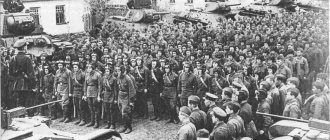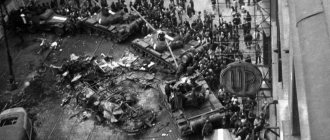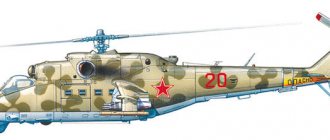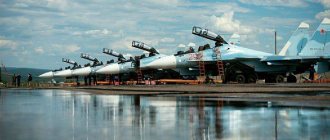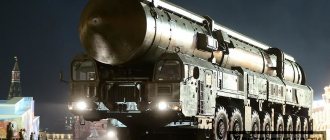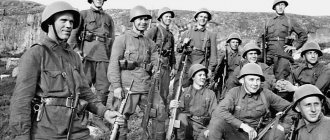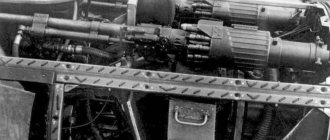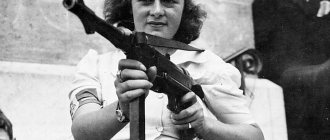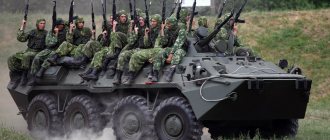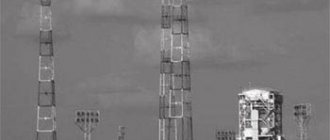With the onset of the Khrushchev Thaw, a number of serious socio-political changes emerged in the Soviet Union, which were supposed to overturn the established opinion about the USSR as a country with a totalitarian regime. Despite the fact that many innovations and reforms introduced into the socio-political life of the country outwardly looked reformist and democratic, the essence of the Soviet management system did not change. The foreign policy of the Soviet Union, aimed at expanding spheres of influence and maintaining won positions, also remained unchanged. Methods of foreign policy influence on the policies of satellite countries and political regimes in third world countries have also been preserved. All means were used, from political blackmail to threats of using military force.
All the charm of the love of the Soviet Union and the care of brothers in the socialist camp in the late 60s of the 20th century was fully felt by Czechoslovakia. This country, despite the socialist path of development, made an attempt to follow its own path of development. The result of such courage was an acute political crisis that erupted in the country, which was ended by an armed invasion - the entry of Soviet troops into Czechoslovakia.
The beginning of Operation Danube - the end of brotherly friendship
August is one of the most significant months in history, especially in the turbulent 20th century. In this month, with chronological accuracy, significant events occur that influence the subsequent course of history, changing the destinies of peoples. In 1968, the month of August was no exception. In the dead of night on August 21, 1968, one of the largest military operations since 1945, codenamed “Danube,” began in Europe.
The scene of action was the Central European state of the Czechoslovak Socialist Republic, which until that moment had been one of the main pillars of the socialist camp. As a result of the invasion by troops of the Warsaw Pact countries, Czechoslovakia found itself under occupation. The Prague Spring, a revolutionary period in the country's history, was suppressed through the use of brute military force. All reforms carried out in the country that were revolutionary in nature were curtailed. The military intervention in Czechoslovakia became a serious crack that split the unity of the socialist camp.
It cannot be said that the socialist front was united in this impulse. Protest and disagreement with the methods being pursued were expressed by those countries that tried to pursue a balanced foreign policy, distancing themselves from the excessive tutelage of the USSR. Romania, Yugoslavia and Albania opposed the entry of troops from the Warsaw Warsaw armies into Czechoslovakia. After these events, the leadership of Albania generally set a course towards secession from the membership of the Warsaw Pact Organization.
From a technical point of view, Operation Danube can be considered a model of tactical and strategic planning. The territory of the country was occupied by large military contingents in just three days. Even taking into account the fact that the invasion forces did not encounter organized resistance from the Czechoslovak People's Army, losses during such a large-scale operation were extremely small. Soviet units participating in Operation Danube lost 36 people killed and wounded, excluding non-combat losses. The occupation of Czechoslovakia was not so peaceful for the civilian population. 108 people became victims of direct armed clashes with the occupation forces, and more than half a thousand were injured.
In this case, it was not without provocation. In addition to the fact that troops ready for invasion were concentrated on the borders of Czechoslovakia, the start of the operation had to be carried out secretly and covertly. At the airport of the Czechoslovak capital, a Soviet passenger plane made an emergency landing at night, from the cabin of which, to the surprise of the airfield service personnel, armed paratroopers began to disembark. After the capture group captured all the main hubs and control points of the airport, Soviet transport planes began to land on the runway one after another. Soviet transport planes loaded with military equipment and troops arrived every 30 seconds. From that moment on, the fate of the Prague Spring was sealed.
At the same time, after receiving a signal about the successful start of the operation, Soviet troops, army units of the National People's Army of Germany, units and mechanized units of the Polish Army, the People's Army of Bulgaria and Hungary invaded the territory of Czechoslovakia. The invasion was carried out from three directions. Columns of the NPA and the Polish Army were coming from the North. From the East, through Transcarpathia, Soviet troops invaded the territory of Czechoslovakia. The troops of the Hungarian People's Army and parts of the Bulgarian army advanced from the southern flank. Thus, the “rebel republic” was engulfed in dense steel pincers.
It is important to note that at the very last moment the army units of the German Democratic Republic were withdrawn from participating in the invasion. The Soviet leadership did not want to have an analogy with the Wehrmacht invasion of Czechoslovakia in 1938. German troops were ordered to stop at the border, being in constant combat readiness. Polish, Hungarian and Bulgarian units performed an auxiliary function, controlling the peripheral regions of the country and the section of the border between Czechoslovakia and Austria. The main tasks during Operation Danube were carried out by Soviet troops, which were brought together into two fronts - the Carpathian and Central. The total number of Soviet troops involved in the invasion was about 200 thousand soldiers and officers.
In tactical terms, the Soviet Union allocated large forces to participate in Operation Danube. A total of 18 Soviet divisions took part in the operation, including tank, airborne and motorized rifle divisions. From the air, the troops had serious air support. There were 22 regiments of helicopter and aviation units of front-line aviation alone. The number of Soviet tanks was unprecedented, approximately 5,000 vehicles used for the operation! The total number of army units and units of the armed forces of the countries that took part in Operation Danube was about half a million people.
The motive that guided the leaders of the countries that took part in the invasion is interesting. The Prague Spring was declared an attempt by counter-revolutionary forces to take revenge, the purpose of which was to eliminate the socialist gains of the Czechoslovak people. In this regard, the USSR and other countries of the socialist camp are forced to come to the aid of the people of fraternal Czechoslovakia in defending their gains.
Swastika over Hradcany
The President of Czechoslovakia, Emil Haha, received the news of the beginning of the occupation of his country in... Berlin! When Slovakia declared its independence, he went to the German capital at the invitation of Hitler to receive an ultimatum. Under the threat of massive bombing, President Haha was demanded to agree to the establishment of a German protectorate over Bohemia and Moravia, as well as recognition of the secession of Slovakia.
It was five minutes to four in the morning on March 15 when Emil Haha and Czechoslovak Foreign Minister Frantisek Chvalkovsky signed an agreement on the annexation of the country. By this time, German troops had already crossed the border and were moving towards Prague. A day earlier, Hungarian troops crossed the border of Czechoslovakia and occupied the Transcarpathian region of Ukraine. In fact, by the morning of March 15, Czechoslovakia as an independent and independent state ceased to exist.
On March 15, Adolf Hitler, who arrived in Prague occupied by German troops and entered Prague Castle, announced the creation of the German protectorate of Bohemia and Moravia, the recognition of independent Slovakia and that all this was being done to prevent bloodshed, which, they say, inevitably led there would be an ethnic crisis in the country. Emil Gaha was immediately declared president of the protectorate, having done so much to ensure that Berlin’s plans were realized without much effort. He remained in this position until the very end of Greater Germany - until May 1945. That same year he was arrested for treason and collaboration with the Germans, but escaped trial because he died in June 1945 in a prison cell.
The further history of “independent” Slovakia turned out a little better. Its independence was recognized only by Berlin, Tokyo and Rome and the Axis satellites, as well as the USSR (which reversed its decision after the outbreak of war). After the outbreak of World War II, the Slovaks, resorting to military force, seized the lands lost from Poland in the 1920s. But in return, Bratislava was forced to form and send the Slovak Expeditionary Force to the Eastern Front, a significant part of which in 1943 went over to the side of the Red Army. Two years later, on May 4, 1945, the Slovak Republic fell, and its president, Josef Tiso, was soon hanged for treason.
The real reasons for the conflict
Since the end of World War II, Czechoslovakia has been a sphere of interest of the Soviet Union. To ensure the strength of the socialist camp, the Warsaw Treaty Organization and the Council for Mutual Economic Assistance (CMEA) were created. All this was supposed to keep countries and states of a socialist orientation in the orbit of the political influence of the USSR. Based on this, any changes in the political structure of government, changes in the foreign policy course of allied countries caused a sharp reaction in the Kremlin. The events in Hungary in 1956 are clear confirmation of this. Even then, the Soviet Union had to use force to suppress the outbreak of popular unrest.
By 1968, Czechoslovakia found itself in a similar situation. By this time, a difficult internal political situation had matured in the country, which seriously shook the hegemony of the ruling Czechoslovak Communist Party. The faithful Soviet course of development was replaced by Alexander Dubcek, the First Secretary of the Central Committee of the Communist Party of Czechoslovakia A. Novotny. His main political position was based on a radical renewal of party policy in relation to the leadership of the country's socio-political life and economy.
The first steps in this direction looked optimistic. Censorship was weakened and business policies in the country were simplified. The country was on the verge of radical economic reforms. At first glance, the stated position looked progressive and modern, however, according to curators from Moscow, such steps could cause a gradual departure of Czechoslovakia from the socialist path of development. In the intentions of the Czechoslovak communists, Soviet leaders saw a desire to pursue rapprochement with the West. They were not going to silently contemplate what was happening in the Soviet Union, so a long diplomatic game began. The leaders of the GDR and Poland supported the unrest and feelings of the Soviet leadership regarding the events in Czechoslovakia. The leaders of Yugoslavia, Albania and the Socialist Republic of Romania, Josif Broz Tito, Enver Hoxha and Nicolae Ceausescu, opposed interference in the internal affairs of a sovereign state, as well as subsequently against the entry of troops into Czechoslovakia.
By the way: The last two leaders subsequently became dictators and managed to stay in power for a significant period. Enver Hoxha died of natural causes in 1985. Romanian dictator Nicolae Ceausescu was tried by a military tribunal and executed by firing squad in the 1989 revolution.
The events that took place in Czechoslovakia in those days could have had an extremely negative impact on the socio-political life of neighboring countries. The situation in Poland was turbulent. Hungary has not yet forgotten the events of 12 years ago. The slogan declared by the Czechoslovak communists - “let's build socialism with a human face” undermined the basic foundations of the socialist system. The liberal policy pursued by the party leadership of Czechoslovakia, in its goals and objectives, diverged from the line of the CPSU Central Committee. The Czechoslovak experiment could become a detonator that could provoke a subsequent chain reaction in the socialist camp. This could not be allowed either in the Kremlin or other capitals of the Eastern European socialist states.
links
- History and biographies. Prague spring. Its reasons Retrieved from Historiaybiografias.com
- Meset, Gabriel. Prague Spring: a year in which we live in danger. Retrieved from elcomercio.pe
- Manetova, Eva. The day the Prague Spring died. Retrieved from radio.cz
- Editorial staff of the Encyclopedia Britannica. Prague spring. Retrieved from britannica.com
- History.com staff. The Prague Spring begins in Czechoslovakia. Retrieved from history.com
- Vrabie, Catalina. 50th anniversary of the Prague Spring. Retrieved from enrs.eu
- Poggioli, Sylvia. Prague Spring: teachings of democracy. Retrieved from npr.org
- LivingPrague.com. History of Prague - Prague Spring. Retrieved from livingprague.com
Goals and methods of pressure on Czechoslovakia
The Soviet leadership, having fresh memories of the events in Hungary in 1956, made every effort to resolve the Czechoslovak crisis peacefully. Initially there was a game of giveaway. The Soviets were willing to make significant political concessions to the new Czechoslovak leadership in exchange for commitment to the ideals of socialist internationalism and a restrained policy towards the West. The military aspect was not considered at first. Czechoslovakia was an important element of the united strategy of the Warsaw Warsaw War, an active participant in CMEA, and a major economic partner of the USSR. According to the party leadership of the USSR, using military force against its main ally was unacceptable. This option was considered as the most extreme case, when all mechanisms and means of a peaceful political settlement would be exhausted.
Despite the fact that the majority of members of the Politburo spoke out against the entry of troops into Czechoslovakia, the military received clear instructions to develop a strategic operation for the invasion of the armed forces of the Warsaw Warsaw countries into the territory of the Czechoslovak Socialist Republic. Subsequent information that Czechoslovakia was not going to make concessions in its position only convinced the Soviet leadership of the timeliness of the preparatory operations. An extraordinary congress of the Communist Party of Human Rights is scheduled for September 9; on August 16, the Politburo, by a majority vote, decided to use the armed forces to suppress the counter-revolutionary rebellion in the fraternal republic.
In order to whitewash itself in the eyes of the socialist community and distribute responsibility to other political players, the Soviet leadership specially held a meeting of the countries participating in the Warsaw Warsaw War on August 18 in Moscow. The leaders of Eastern European countries present at the meeting supported the initiative of the Soviet leadership.
The official version for the provision of military assistance was the appeal of a group of public and party leaders of the Communist Party of China to the Central Committee of the CPSU to other fraternal parties with a request to provide military-political international assistance. The address hinted at the counter-revolutionary activities of the current party leadership of Czechoslovakia and the need to urgently change the country's leadership by any means necessary. For the Czechoslovak side, preparations for the deployment of troops did not come as a surprise. The Ministry of Defense of the Czechoslovak Socialist Republic and other party leaders of the country were informed that a large-scale military-police action was planned.
Program
The festival always celebrates important musical anniversaries by presenting a selection of works by anniversary authors, as well as world and Czech premieres of contemporary composers. Artists and orchestras of the highest quality are invited to perform in concert. In addition to classical music, there have always been several jazz music concerts in recent years.
Each year, one particular theme of the festival is chosen, for example: the celebration of the 100th anniversary of the founding of the Czechoslovak Republic (the program then featured works by Bohuslav Martino, Leos Janacek and Eugen Suchon, as well as works by their current successors, including Marko Ivanovic, Michal Nejtek and Lukas Sommer) or the 70th anniversary of the creation of the State of Israel (you could listen to works by authors with Jewish roots - “Violin Concerto” by Felix Mendelssohn-Bartholdy, cantata “Survivor from Warsaw”, written by Arnold Schoenberg in exile in the USA, 3rd symphony “Kaddish” American composer and conductor Leonard Bernstein).
Also, over the years, festival visitors could hear “Classical Symphony” by S. Prokofiev, the opera “Lohengrin” by Richard Wagner, “The Hungarian Castle” by Bel Bartka, and “The Ghost of the Bride” by Dvorak. The symphony was performed by the Czech Radio Orchestra and the Prague Philharmonic together with soloist Adam Plachetka and his wife Catherine.
Festival program on the official website
The Prague Spring Festival also takes care of young performers. The competition of the same name was founded a year after the founding of the festival and is held annually in various instrumental areas before the festival's concert program. The awarded laureates of this competition are mainly leading performers in their field, for example: bassoonists L. Huček and V. Vonašek, oboists I. Adamus and L. Skeardtová, violinists I. Strauss, B. Matushek and I. Senata, pianists M. Kasik and I. Kahanek, horn player R. Baborak, trumpeter Vl. Reylek, organists V. Rabas and A. Barta, cellist M. Rostropovich, singer D. Petskov and many others.
Festival Pražské jaro
“Give up the Sudetes!”
“The best communist is a dead communist, and if he is still alive, then his legs should be pulled out,” this phrase belongs to the chairman of the Czech organization Club 231, registered in the spring of 1968, Jaroslav Brodsky. Having a Jewish surname, he headed an organization that united former Nazis, employees of the puppet pro-German government during World War II - either amnestied or escaped punishment. They actively created branches at large enterprises. There were up to 70 of them throughout the country with a total number of members of about 40 thousand.
The country welcomes the demon of American politics, Zbigniew Brzezinski, who calls the Czech experiment “interesting” and lectures on the need to destroy the Communist Party, the police and state security agencies. All this is against the backdrop of a rabid anti-Soviet campaign. In particular, a certain “Revolutionary Committee of the Democratic Party of Slovakia” openly called for the annexation of Transcarpathian Rus' to Czechoslovakia already in 1968. This, who doesn’t know, is the territory of Ukraine.
But completely different publications appeared in the West German press: “The Sudeten Germans will expect from Czechoslovakia, liberated from communism, a return to the Munich Agreement, according to which in the fall of 1938 the Sudetenland ceded to Germany,” wrote the newspaper “General Anzeiger.” They were preparing to pull off Hitler’s “feint” with the Czechs, who took the Sudetenland from them.
The Presidium of the Czechoslovak Communist Party did not support the invasion, which broke the plans of the USSR
As soon as news of the invasion became known in Czechoslovakia, the Presidium of the Communist Party of the Republic, headed by the reformer Alexander Dubcek, urgently met in Prague. The majority of its members supported the statement condemning the force operation of the Soviet troops: seven votes were cast for this document and four were against.
This came as a surprise to the authorities of the Union: after preliminary negotiations with opponents of the Czechoslovak authorities in the summer of 1968, it was expected that the advantage in the presidium would be 6:5 in favor of Dubcek’s opponents.
This fact, along with several others, was extremely important, as it disrupted the plans of the leaders of the USSR, slowed down and complicated the process of overthrowing the reformist government in Czechoslovakia.
Photo: -
Leader and reformer of Czechoslovakia Alexander Dubcek / Photo CTK Photo / Jiri Rublic
For example, it was planned that against the backdrop of the invasion, the so-called “healthy forces” of Czechoslovakia (supporters of the entry of troops from among the Czechoslovak Communist Party) would immediately hold a plenum of the Central Committee and form a new government. However, this was not possible: radio and media, with the support of the Czech population, declared these politicians traitors, they had to take refuge in the Soviet embassy, and the Soviet leadership was forced to look for a compromise solution.
The leaders of Czechoslovakia were forcibly taken to the USSR for forced negotiations. which took place in Moscow on August 24−27, 1968. There they were forced to sign a joint communique, in which the timing of the withdrawal of troops from Czechoslovakia was made dependent on the “normalization of the situation in Czechoslovakia.” As a result, Soviet troops remained in the country until 1991.
Dubcek formally lost his position only six months later: in April 1969, Gustav Husak was elected first secretary of the Central Committee of the Communist Party of Czechoslovakia.
The Czechoslovak uprising in the heart of Russia
The authorities of the Entente countries were very unhappy with the withdrawal of Soviet Russia from the war. Moreover, the Western powers feared for the fate of the military cargo they had delivered to Russia, but never used, and which was in the warehouses of the largest domestic ports. Therefore, in the spring of 1918, the Entente raised the issue of intervention by Soviet Russia.
After the signing of peace between the Bolshevik government and the Central Powers, not only Czechs and Slovaks moved en masse across Russia, but also prisoners of war of German and Hungarian origin who were to be released.
Also on topic
“Banditry was put against the wall”: how the defeat of the anarchist movement in Russia began. 100 years ago, the liquidation of anarchist organizations began in Soviet Russia. Felix Dzerzhinsky's security officers stormed 26...
Due to mutual antipathy, the fighters of the Czechoslovak Corps constantly had clashes with them. The nervous atmosphere was also intensified by the fact that Moscow, under pressure from Germany, was delaying the process of sending the Czechoslovak Corps to Vladivostok. The servicemen feared that they might be deported to Austria-Hungary, where “traitors” would face execution or hard labor.
Army photos on Shutterstock: Army and military photos.
On May 14, 1918, in Chelyabinsk, from a train transporting Hungarian prisoners, a cast-iron stove leg flew at the Czechs, seriously injuring soldier Frantisek Duhacek. Soldiers of the Czechoslovak Corps detained the culprit and “punished” him by inflicting several blows with a bayonet. Local Bolshevik authorities arrested Czechoslovak soldiers and attempted to completely disarm the trains in the city. In response, soldiers of the Czechoslovak Corps captured the local arsenal and artillery battery on May 17 and freed their fellow countrymen.
A few days later, members of the Czechoslovak National Council were arrested in Moscow, who, at the request of Leon Trotsky, appealed to their compatriots for disarmament and an end to the rebellion. But the corps personnel had already elected their own self-government bodies, which, in response to attempts by the Soviet authorities to disarm the Czechs and Slovaks, called on their fellow countrymen not to surrender their weapons, but, if necessary, to resist the local authorities.
On May 26-27, 1918, armed clashes began between Czechoslovak units and Red Guards in Irkutsk and Zlatoust. Being a powerful organized military force, the corps defeated Soviet units and in just a few weeks captured Petropavlovsk, Kurgan, Omsk, Novonikolaevsk, Mariinsk, Tomsk and other cities.
- Civil War. Eastern front. Soldiers of the Czechoslovak Corps with a captured pennant of the Soviet detachment
On June 4, the Entente declared that the Czechoslovak Corps was part of its troops. In June, the first Russian anti-Bolshevik governments were formed in Samara and Omsk captured by the corps.
Alexander Dubcek was initially taken to Ukraine
At about 10 a.m. on August 21, KGB officers and the Czechoslovak state security service escorted Alexander Dubček and five other country leaders and his associates from the building of the Central Committee of the local Communist Party: Prime Minister Oldřich Chernik, Speaker of Parliament Josef Smrkovský, members of the Central Committee of the Communist Party of Czechoslovakia Josef Špaček and Bohumil Šimon, as well as the head of the National Front, Frantisek Kriegel.
Initially, they were taken to Western Ukraine - by plane to Uzhgorod, and from there on armored personnel carriers to the country residence of the Transcarpathian Regional Committee of the Communist Party of Ukraine near the village of Kamyanitsa, where they were kept in isolation separately.
When Dubcek entered the office and saw me, he said: “Now I know where I am. Because they were transporting me in an armored personnel carrier and I thought it was Poland.”
Yuriy Ilnitsky, at that time the first secretary of the Transcarpathian regional committee of the Communist Party of Ukraine, who enjoyed the special favor of Brezhnev, recalled the task entrusted to him (his words are given in the book Ukraine Incognita): “On August 22, they called me from Moscow that six members of the presidium would be brought to the Transcarpathian region Central Committee of the Communist Party of Czechoslovakia: Dubcek, Chernik, Smrkovsky, Kriegel, Shimon, Spacek. They asked to accommodate them well and ensure a proper high standard of stay. […] I decided to settle them in two houses in Kamyanitsa.”
Already on the night of August 23, Brezhnev called the Ukrainian official, demanding that Dubchek be taken to Ilnitsky’s office in Uzhgorod. Dubcek, wearing dark glasses to prevent accidental identification by anyone, was immediately taken to Uzhgorod.
“When Dubcek came into the office and saw me, he said: “Now I know where I am. Because they were transporting me in an armored personnel carrier and I thought it was Poland,” says Ilnitsky. — Soon Brezhnev called, asked how things were going, and said that Nikolai Podgorny [Chairman of the Presidium of the Supreme Soviet of the USSR] would talk to my guest. And so it was. After talking with Podgorny, Dubcek said: “A plane will fly for me to Mukachevo. I have to fly them to Moscow.” Later, Podgorny called me and gave instructions to ensure the gradual dispatch of other members of the Presidium of the Central Committee of the Communist Party of Czechoslovakia to Moscow. This happened on August 23.”
Literature
- Viveg Michal.
The best years are down the drain. Chroniclers of fatherly love = Bajecna leta pod psa. Zapisovatele otcovsky lasky. - M.: Inostranka, B.S.G.-Press, 2003. - 448 p. - (Porthole). — 5,000 copies. — ISBN 5-94145-107-5. - The USSR invasion of Czechoslovakia // Wars of the second half of the 20th century / Auth.-comp. A. N. Gordienko. - Mn.: Literature, 1998. - 544 p. — (Encyclopedia of Military Art). — 22,000 copies. — ISBN 985-437-507-2.
- Kundera Milan.
The unbearable lightness of being = Nesnesitelna lehkost byti / Transl. from Czech N. Shulgina. - M.: Azbuka-classics, 2002. - 352 p. — 5,000 copies. — ISBN 5-352-00176-8. - Lavrenov S. A., Popov I. M.
// Chapter 11. “Prague Spring”, 1968 - M.: Astrel, 2003. - P. 289-336. — ISBN 5-271-05709-7. - Mayorov A. M.
Invasion. Czechoslovakia, 1968. Testimony of the army commander. - M.: Human Rights, 1998. - 352 p. — ISBN 5-7712-0082-4. - Medvedev R. A.
Andropov. - M.: Young Guard, 2012. - 480 p. - (Life of wonderful people). — 5,000 copies. — ISBN 978-5-235-03506-5. - Mlynarz Zdenek.
Frost struck from the Kremlin. Memoirs of one of the leaders of the “Prague Spring” of 1968 / Trans. from Czech S.I. Razuvan. - M.: Republic, 1992. - 287 p. — 50,000 copies. — ISBN 5-250-01630-8. - Musatov V.L.
Russia and Eastern Europe: a connection of times. - M.: LKI, 2008. - 224 p. — 4,000 copies. — ISBN 978-5-382-00945-2. - Chiefs
of the Battle of Russia: encyclopedia. - M.: AST, 2006. - 699 p. — (Military History Library). — ISBN 5-17-010649-1. - Chic Ota.
Spring revival - illusions and reality. - M.: Progress, 1991. - 392 p. — 50,000 copies. — ISBN 5-01-003522-7.
They saved the Czechs
As a result of the entry of Warsaw Pact forces, according to official data (they vary greatly in different sources), 12 Soviet soldiers were killed, 87 were wounded and injured. 108 Chekhovs and Slovaks died. But who is to blame? This is what Vasily Semyon, a participant in those events and now a deputy of the Lviv regional council and editor-in-chief of the newspaper “Our Batkivshchyna”, remembers, who certainly cannot be suspected of sympathizing with the USSR: “Most of my platoon died - the ZIL in which they were transported fell from a cliff . They said that they were “cut off” by a Czech car. The guys from Lugansk died. There was a shot from our side. A taxi driver wanted to run over one guy, an Ossetian. He jumped back and fired. But he didn’t hit the taxi driver, but the passenger, who turned out to be the daughter of a party functionary. He wounded her and spent six months under investigation. True, then they finally released him.”
Ours fired extremely rarely; they were ordered not to succumb to provocations. More often, documents of that time dryly record other situations: “The crew of the tank 64 MSP 55 MSD (sergeant major Andreev Yu. I., junior sergeant Makhotin E. N. and private Kazarik P. D.) on the way of movement met a crowd of young people organized by counter-revolutionary elements and children. In an effort to avoid casualties from the local population, they decided to bypass it, during which the tank overturned. The crew died."
Senior Sergeant Nikolai Meshkov recalls: “A crowd of 500 - 600 people became a wall, as if on command, we were separated by 20 meters. From the back rows they lifted four people in their arms, who looked around. The crowd fell silent. They showed something to each other with their hands, and then instantly pulled out short-barreled machine guns, and 4 long bursts thundered. We did not expect such a trick. 9 people fell dead. Six were wounded, the shooting Czechs instantly disappeared, the crowd was dumbfounded. Later we became smarter, we rounded up all the strikers and checked everyone for weapons. People with weapons were transferred to headquarters. Weapons were also found on women; they skillfully hid them, not only pistols, but also grenades.”
Role of Poland
Poland’s position was of key importance in the crisis of 1938 due to its mobilization potential. It was home to 43.8 million people (in France, for comparison, 41.7 million). The population of the Third Reich, after the annexation of Austria, was 76 million. Thus, the total mobilization potential of France, Poland and Czechoslovakia - about 100 million - noticeably exceeded that of Germany.
It can be assumed with a high degree of probability that Poland's actively expressed position in support of its long-time ally France and the neighboring Slavic state would have prompted France to take a tougher position in relation to Hitler's claims. However, Poland used the difficulties of Czechoslovakia to satisfy its own claims against it in the Cieszyn region.
The Polish army concentrated its forces at the end of September 1938 on the southwestern border, but not in order to provide assistance to Czechoslovakia. The goals of the 35,000-strong Task Force Silesia were completely different.
The Munich conference hurt the great power ambitions of Józef Beck (Polish Foreign Minister), as it was decided that Polish claims regarding Cieszyn Selesia would be the subject of a separate international conference.
Therefore, Poland had to immediately demonstrate to the world its great power. A letter from President Benes to his Polish counterpart Ignacy Mosticki dated September 22, 1938, containing a proposal to resolve the Cieszyn Silesia dispute in exchange for Polish neutrality regarding the Czechoslovak-German conflict, remained unanswered as a result of Beck's intrigues.
By midnight on September 30, the government in Prague received a Polish ultimatum on the disputed territory with a response period of 12 hours. Lack of response, as well as refusal, meant war.
Polish 7TR tanks enter the Czech city of Tesin. October 1938
The Czechoslovak government accepted the Polish ultimatum on October 1, 1938. The next day, Polish soldiers crossed Olza. Propaganda exploded into pathos and a mood of complete patriotic exaltation. Polish society, disoriented because of it, allowed itself to be captured by these sentiments. The Czechs were left with a deep trauma regarding Poland and the Poles.
At the same time, Poland took an extremely negative position regarding the possible passage of Soviet troops to help Czechoslovakia.
Considering what happened to Poland less than a year later, the desire at all costs to prevent Soviet troops from entering Poland under any pretext should be considered completely justified behavior on the part of Poland. However, taking into account the same consequences, complicity in the division of Czechoslovakia turned out to be fatal for Poland.
If Poland at that moment had temporarily renounced its claims to Czechoslovakia and, paying attention to the main threat to peace in Central Europe, had expressed support for France and Czechoslovakia, it would very likely have avoided the sad fate that befell it in 1939. The French Ambassador in Warsaw, Leon Noel, assessed Polish policy towards Czechoslovakia in 1938:
The French Ambassador in Warsaw, Leon Noel, assessed Polish policy towards Czechoslovakia in 1938:
On September 28, 1938, Ambassador Noel told the chief of Polish diplomacy:
Hitler might not have dared to attack such an alliance of three states. The democracies of the continent could stop Nazi aggression.
In general, it was a fateful moment that could radically change the entire subsequent course of world history. And it so happened that he was made highly dependent on the decision of Poland.
Unfortunately, the leadership of Poland in this key period for the historical existence of the country and the world chose a different path.
But at the same time, France’s responsibility cannot be discounted. It was she who had the moral responsibility to encourage her historical ally, Poland, to take the right course of action. France also paid dearly for its shortsightedness, but already in 1940.
The invasion provoked a wave of emigration from Czechoslovakia
After the defeat of the Prague Spring as a result of the invasion of Soviet troops, hundreds of citizens, including representatives of the cultural intelligentsia, left Czechoslovakia. Immediately shortly after the Danube operation, about 70 thousand people emigrated from the country, and in total the number of people who left for the West reached 300 thousand people.
Milan Kundera wrote: “The Czech Republic is now doomed to forever stutter, stammer and gasp for air, like Alexander Dubcek. The holiday is over. The everyday life of humiliation has arrived"
Among them is the famous writer Milan Kundera, who wrote about the events of August 21: “The Russian invasion was not only a tragedy, but also a feast of hatred, full of amazing (and now inexplicable to anyone) euphoria. […]. However, no celebration can last forever. The Russians forced Czech statesmen to sign some kind of compromise statement in Moscow. Dubcek returned to Prague and read it on the radio. After a six-day imprisonment, he was so crushed that he could not speak, he stuttered, barely caught his breath, interrupting his sentences with endless, almost half-minute pauses. The compromise saved the country from the worst: from executions and mass exiles to Siberia, which instilled horror in everyone. But one thing was clear: the Czech Republic is now doomed to stutter, stammer and gasp for air forever, like Alexander Dubcek. The holiday is over. The everyday life of humiliation has arrived.”
